
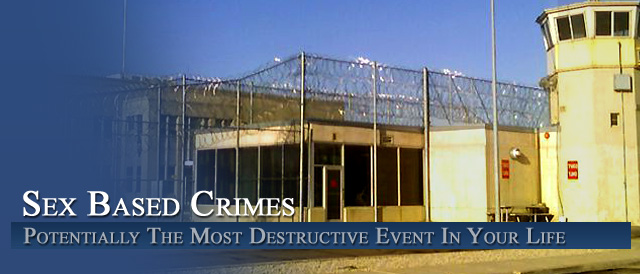
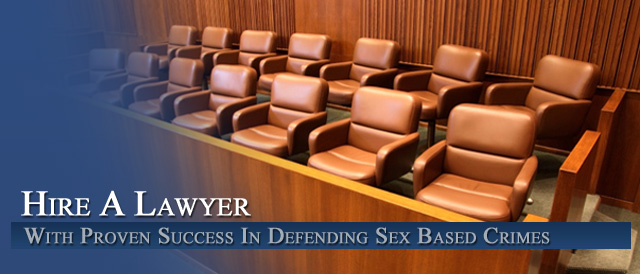
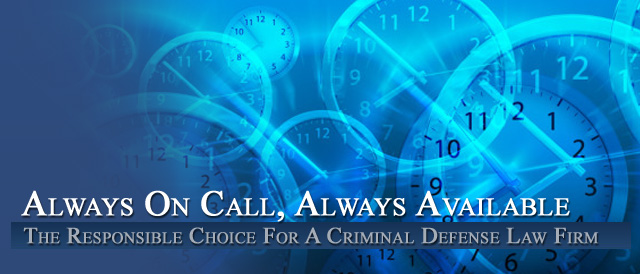

Colorado Criminal Law – The Impact Of A Felony Sex Crime On A Professional License – Colorado Real Estate Broker’s License
By H. Michael Steinberg Colorado Sex Crimes Criminal Defense Lawyer – Attorney
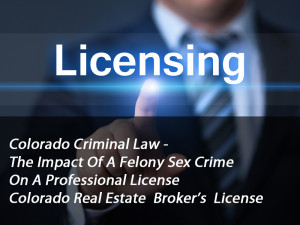 Colorado Criminal Law – The Impact Of A Felony Sex Crime On A Professional License – Colorado Real Estate Broker’s License – Colorado felony sex crime convictions can result not just in the punitive sanctions that accompany the conviction – but in the loss of or denial of a professional license such as a real estate brokers license.
Colorado Criminal Law – The Impact Of A Felony Sex Crime On A Professional License – Colorado Real Estate Broker’s License – Colorado felony sex crime convictions can result not just in the punitive sanctions that accompany the conviction – but in the loss of or denial of a professional license such as a real estate brokers license.
The Colorado Real Estate Commission (the Commission) is the body responsible for making the determination, in a situation where a person has – (or is seeking to obtain) a Colorado real estate broker’s license, whether that person keeps that license or that license is collateral damage that is the direct result of the sex crimes conviction.
A similar analysis applies to countless other professionals such as nurses, EMT’s, Medical Doctors, Chiropractors and the like.
One relatively recent case – Colo. Real Estate Comm’n v. Bartlett, 272 P.3d 1099 (Colo. App. 2011) – addressed whether a Colorado Real Estate Broker would be allowed to retain his license after sustaining a conviction for Attempted Sexual Assault On A Child in violation of sections 18-2-101 and 18-3-405(1), C.R.S. 2010, a class five felony. Bartlett was sentenced to five years of sex offender intensive supervision probation (SOISP).
Understanding The Crimes That Impact A Colorado Real Estate Broker’s License
This entire area – permitting the licensure of professionals – is controlled by Colorado Administrative and Statutory Law. Specifically, the statute that governs real estate brokers is § 12-61-113. Investigation – Revocation – Actions Against Licensee – here is the sections of the law (m and m6) that apply to criminal acts:
§ 12-61-113. Investigation – Revocation – Actions Against Licensee
(1) The commission, upon its own motion, may, and, upon the complaint in writing of any person, shall, investigate the activities of any licensee or any person who assumes to act in such capacity within the state, and the commission, after the holding of a hearing pursuant to section 12-61-114, has the power to impose an administrative fine not to exceed two thousand five hundred dollars for each separate offense and to censure a licensee, to place the licensee on probation and to set the terms of probation, or to temporarily suspend or permanently revoke a license when the licensee has performed, is performing, or is attempting to perform any of the following acts and is guilty of:
….
(m) Conviction of, entering a plea of guilty to, or entering a plea of nolo contendere to any crime in article 3 of title 18, C.R.S.; parts 1, 2, 3, and 4 of article 4 of title 18, C.R.S.; part 1, 2, 3, 4, 5, 7, 8, or 9 of article 5 of title 18, C.R.S.; article 5.5 of title 18, C.R.S.; parts 3, 4, 6, 7, and 8 of article 6 of title 18, C.R.S.; parts 1, 3, 4, 5, 6, 7, and 8 of article 7 of title 18, C.R.S.; part 3 of article 8 of title 18, C.R.S.; article 15 of title 18, C.R.S.; article 17 of title 18, C.R.S.; section 18-18-404, 18-18-405, 18-18-406, 18-18-411, 18-18-412.5, 18-18-412.7, 18-18-412.8, 18-18-415, 18-18-416, 18-18-422, or 18-18-423, C.R.S.,
… or any other like crime under Colorado law, federal law, or the laws of other states.
…A certified copy of the judgment of a court of competent jurisdiction of such conviction or other official record indicating that such plea was entered shall be conclusive evidence of such conviction or plea in any hearing under this part 1.
(m.6) Failing to immediately notify the commission in writing of a conviction, plea, or violation pursuant to paragraph (m) or (m.5) of this subsection (1);
Here are some of the kinds of crimes not identified by name in the statute but referred to as “articles:”
Title 18 – Colorado’s Criminal Code (articles from above statute identified – but see catch all for all crimes – above)
Article 3. Offenses Against the Person (§§ 18-3-101 – 18-3-602)
Article 4. Offenses Against Property (§§ 18-4-101 – 18-4-802)
Article 5. Offenses Involving Fraud (§§ 18-5-101 – 18-5-905)
Article 5.5. Computer Crime (§§ 18-5.5-101 – 18-5.5-102)
Article 6. Offenses Involving the Family Relations (§§ 18-6-101 – 18-6-805)
Article 7. Offenses Relating to Morals (§§ 18-7-101 – 18-7-801)
Article 8. Offenses – Governmental Operations (§§ 18-8-101 – 18-8-804)
Article 17. Colorado Organized Crime Control Act (§§ 18-17-101 – 18-17-109)
Article 18. Uniform Controlled Substances Act of 2013 (§§ 18-18-101 – 18-18-606)
The 2011 Bartlett Case As Illustration
An Administrative Law Judge (ALJ) made the decision that Bartlett, having pled guilty to the crime of Attempted Sexual Assault on A Child and having to failed to immediately report the conviction – violated both sections (m and m6 -above).
The Administrative Law Judge recommended the revocation of his license to the Colorado Real Estate Commission. The Commission accepted the initial decision and issued a final agency order revoking Bartlett’s real estate broker’s license.
A category of crimes included in section 12-61-113 is the article 3 crime of sexual assault on a child under section 18-3-405, C.R.S.,
Sex crimes are among the crimes (crimes of moral turpitude) that, as a matter of public policy, are most concerning to the Commission as convictions for these crimes raise concerns regarding public safety.
But that is not the end of the analysis. A conviction for a sex crime alone does not mean the immediate loss of a professional license. There is another law in Colorado – Section 24-5-101- that also reflects a strong public policy. This law that is intended to aid ex-offenders in their rehabilitation and to insure that convicted felons and misdemeants are not discriminated against solely because they, at one time, were convicted of crimes.
The Impact Of Section 24-5-101- A Felony Conviction Alone Is Not Enough To Take A Person’s Professional License
Simply put, a felony conviction is – by itself – not sufficient to mandate the loss of a professional license – such as a real estate broker’s license. The Commission CANNOT revoke the license of a realtor based solely on his or her conviction of a felony because of section 24-5-101.
The entire law is reprinted below – however – what follows is the pertinent part that applies to this situation:
§ 24-5-101. Effect of Criminal Conviction on Employment Rights
Section 24-5-101(1)(a), C.R.S. , provides in pertinent part that “the fact that a person has been convicted of a felony . . . shall not, in and of itself, prevent the person . . . from applying for and receiving a license . . . required by the laws of this state to follow any business, occupation, or profession.”
The intent of this law – called it’s legislative intent – is to expand employment opportunities for persons who, notwithstanding that fact of a conviction for an offense, have been rehabilitated and are ready to accept the responsibilities of a law-abiding and productive member of society.
This law applies not only to the applications for licenses, it is directly incorporated into section 12-61- 114(6), C.R.S., and REQUIRES that the Commission be governed by its provisions in any hearing in which there is a possibility of the revocation of an existing license because of a felony conviction.
Stated differently, the laws which govern the taking of disciplinary action against a real estate broker for the commission of a Colorado crime require that the “rehabilitation” of the offender be considered as an essential factor in the evaluation of the revocation of the broker’s license.
The burden of proof on the issue of rehabilitation (essentially the ABSENCE of rehabilitation) is on the Commission. The Commission must prove that not only was the real estate broker convicted of a felony, but also that he or she has not been rehabilitated. Colo. Real Estate Comm’n v. Bartlett, 272 P.3d 1099 (Colo. App. 2011).
The ALJ must consider several factors before revoking a real estate broker’s license including the extent to which the licensee has been rehabilitated and “is ready to accept the responsibilities of a law-abiding and productive member of society.” § 24-5-101(2).
Back To Our Example – The Bartlett Case – Summary – Rehabilitation Evidence
In the Bartlett case, the ALJ:
(1) was required to consider evidence concerning Bartlett’s rehabilitation and
(2) had the burden to prove the absence of rehabilitation.
Evidence of Rehabilitation – Bartlett – Colorado Felony Sex Crime Case
Rehabilitation Evidence Considered And Rejected
In determining whether the Commission sufficiently considered evidence of Bartlett’s rehabilitation – the ALJ found, among other things, considered the following mitigating evidence. Bartlett had:
(1) substantially complied during the first three years of his sentence1 with all terms of his probation;
(2) worked hard in his sex offender therapy and progressed well, though he had not completed the therapy;
(3) taken responsibility for his behavior and shown accountability for his actions;
(4) overcome his substance abuse problem;
(5) maintained a good support system and motivation to resume a healthy relationship with his wife and children;
(6) learned tools and skills to avoid high risk situations; and
(7) not engaged in any further criminal behavior since his arrest.
BUT – while the ALJ made these findings – they were not enough to save his license and while Bartlett failed to retain his license – the case is instructive to other’s finding themselves in this position.
The ALJ had “serious doubts” about Bartlett’s “integrity” because he failed to immediately report his conviction – could not explain the delay, was evasive under oath. Furthermore the ALJ felt that Bartlett minimized his criminal conduct and denied or professed a lack of memory regarding significant aspects of that conduct.
The ALJ also found that the guiding principles of sex offender management suggest that:
(1) sex offenders generally cannot be cured;
(2) successful treatment cannot permanently eliminate the risk that a sex offender will repeat his or her offense;
(3) it is difficult to predict the likelihood of re-offense or future victim selection;
(4) community safety is paramount in sex offender management; and
(5) sex offenders tend to exhibit secretive and deceptive behaviors.
The ALJ also made findings as regards the particular restrictions on Colorado Sex Offenders:
The intensity of the restrictions on Colorado Sex Offenders included:
(1) a prohibition on his having contact with children under eighteen years of age, including the offenders own children without very limiting supervision.
(2) intensive sexual offender treatment and group therapy sessions once a week, as well as semi- monthly therapy sessions with his individual therapist;
(3) the creation of weekly schedules recording his planned movements for the following week;
(4) a mandatory curfew;
(5) polygraphs and chemical testing upon request; and
(6) severe limits on his use of the Internet.
ALJ – Commission’s Decision Unlikely To Be Overturned
If the ALJ and thereafter the Commission revokes a Colorado real estate broker’s license – an appeal of that decision is probably not going to succeed. An agency’s decision is upheld unless it meets the very high standard that the ALJs findings and the Commission’s decision were:
arbitrary or capricious, unsupported by substantial evidence, or contrary to law.
The Colorado Courts of Appeal will always defer to the agency’s determination of the credibility of witnesses and the weight given the testimony and other evidence arising out of the litigation. The Courts of Appeals does not reweigh the evidence or substitute their judgment for that of the Commission.
More specifically, the Colorado Courts of Appeal will uphold a Commission sanction unless it:
(1) bears no relation to the proscribed conduct,
(2) is manifestly excessive in relation to the needs of the public, or
(3) is otherwise a gross abuse of discretion.
To set aside an agency’s determination as arbitrary or capricious, the reviewing court must be convinced, based on the record as a whole, that there is no substantial evidence supporting that determination.
Summary and Conclusion
While Section 24-5-101 reflects a strong public policy of the State of Colorado that convicted felons who have served their sentences and are rehabilitated may be granted business and occupational licenses – the application of this law to Colorado Sex Offenders actually amounts to very little authority.
While sections 12-61-114(6) and 24-5-101 make clear that a Colorado Sex Offender’s felony conviction standing alone is not sufficient to support a license revocation and the ALJ and the Commission bear the burden of proving the additional matters necessary to support the revocation order, specific among them – that the Defendant has not been rehabilitated, as applied to Colorado Sex Offenders – the actual chances of a Colorado real estate broker obtaining or retaining a real estate broker’s license is very, very unlikely.
What follows is a complete reprint of 24-5-101 as promised:
§ 24-5-101. Effect of Criminal Conviction on Employment Rights
(1) (a) Except as otherwise provided in paragraph (b) of this subsection (1), the fact that a person has been convicted of a felony or other offense involving moral turpitude shall not, in and of itself, prevent the person from applying for and obtaining public employment or from applying for and receiving a license, certification, permit, or registration required by the laws of this state to follow any business, occupation, or profession.
(b) This subsection (1) shall not apply to:
(I) The offices and convictions described in section 4 of article XII of the state constitution;
(II) The certification and revocation of certification of peace officers as provided in section 24-31-305 ;
(III) The employment of personnel in positions involving direct contact with vulnerable persons as specified in section 27-90-111, C.R.S.;
(IV) The licensure or authorization of educators prohibited pursuant to section 22-60.5-107(2), (2.5), or (2.6), C.R.S.;
(V) The employment of persons in public or private correctional facilities pursuant to the provisions of sections 17-1-109.5 and 17-1-202(1) (a) (I) and (1.5), C.R.S., and the employment of persons in public or private juvenile facilities pursuant to the provisions of sections 19-2-403.3 and 19-2-410(4), C.R.S.;
(VI) The employment of persons by the public employees’ retirement association created pursuant to section 24-51-201 who, upon the commencement of that employment, will have access to association investment information, association assets, or financial, demographic, or other information relating to association members or beneficiaries; and
(VII) The employment of persons by the department of public safety and the department of corrections.
(2) Whenever any state or local agency is required to make a finding that an applicant for a license, certification, permit, or registration is a person of good moral character as a condition to the issuance thereof, the fact that such applicant has, at some time prior thereto, been convicted of a felony or other offense involving moral turpitude, and pertinent circumstances connected with such conviction, shall be given consideration in determining whether, in fact, the applicant is a person of good moral character at the time of the application.
The intent of this section is to expand employment opportunities for persons who, notwithstanding that fact of conviction of an offense, have been rehabilitated and are ready to accept the responsibilities of a law-abiding and productive member of society.
(3) (a) Unless statute prohibits the employment of a person with a specific criminal conviction for a particular position, an agency shall not advertise the position with a statement that a person with a criminal record may not apply for the position or place on the application a statement that a person with a criminal record may not apply for the position.
(b) With the exception of the department of corrections and the department of public safety, the agency shall not perform a background check until the agency determines that an applicant is a finalist or makes a conditional offer of employment to the applicant.
(c) If, after determining that an applicant is a finalist or after making a conditional offer of employment to an applicant, the agency determines that the applicant has been arrested or charged but not convicted of a criminal offense and the criminal case is not actively pending, the agency shall not use that information as a basis for not making an offer of employment or for withdrawing the conditional offer of employment.
(d) If, after determining that an applicant is a finalist or after making a conditional offer of employment to an applicant, the agency determines that the applicant has had a criminal conviction expunged or sealed from his or her record, received a pardon, or that charges were dismissed pursuant to successfully completing a deferred judgment or sentence, the agency shall not use that information as a basis for not making an offer of employment or for withdrawing the conditional offer of employment unless, after reviewing the factors in subsection (4) of this section, the agency determines that the applicant should be disqualified for the position.
(e) Nothing in this section prevents an agency from considering criminal history information that the applicant voluntarily provides.
(4) Except as provided in subsection (6) of this section, if, after determining that an applicant is a finalist or making a conditional offer of employment to an applicant, the agency determines that the applicant has been convicted of a crime, the agency shall consider the following factors when determining whether the conviction disqualifies the applicant for the position:
(a) The nature of the conviction;
(b) Whether there is a direct relationship between the conviction and the position’s duties and responsibilities and the bearing, if any, the conviction may have on the applicant’s fitness or ability to perform one or more such duties and responsibilities, including whether the conviction was for unlawful sexual behavior as listed in section 16-22-102(9), C.R.S., and whether the duties of employment would place a co-worker or the public in a vulnerable position;
(c) Any information produced by the applicant or produced on his or her behalf regarding his or her rehabilitation and good conduct; and
(d) The time that has elapsed since the conviction.
(5) Notwithstanding any other provision of law to the contrary, the provisions of this section apply to the office of the governor.
(6) If, at any stage in the hiring process, the department of corrections or the department of public safety determines that the applicant has been convicted of a crime, the department must consider the factors listed in paragraphs (a) to (d) of subsection (4) of this section when determining whether the conviction disqualifies the applicant for the position.
Colorado Criminal Law – The Impact Of A Felony Sex Crime On A Professional License – Colorado Real Estate Broker’s License.
If you found any of the information I have provided on this web page article helpful please click my Plus+1 or the Share buttons for Twitter and Facebook below so that others may also find it.
If, after reading this article, you have questions about your case and would like to consider retaining our law firm, we invite you to contact us at the Steinberg Colorado Criminal Defense Law Firm – 303-627-7777.
Never stop fighting – never stop believing in yourself and your right to due process of law. You will not be alone in court, H. Michael at your side every step of the way – advocating for justice and the best possible result in your case.
 ABOUT THE AUTHOR: H. Michael Steinberg – Email The Author at [email protected] – A Denver Colorado Criminal Defense Lawyer – or call his office at 303-627-7777 during business hours – or call his cell if you cannot wait and need his immediate assistance – 720-220-2277. Attorney H. Michael Steinberg is passionate about criminal defense. His extensive knowledge and experience of Colorado Criminal Law gives him the edge you need to properly handle your case.
ABOUT THE AUTHOR: H. Michael Steinberg – Email The Author at [email protected] – A Denver Colorado Criminal Defense Lawyer – or call his office at 303-627-7777 during business hours – or call his cell if you cannot wait and need his immediate assistance – 720-220-2277. Attorney H. Michael Steinberg is passionate about criminal defense. His extensive knowledge and experience of Colorado Criminal Law gives him the edge you need to properly handle your case.
“A good criminal defense lawyer is someone who devotes themselves to their client’s case from beginning to end, always realizing that this case is the most important thing in that client’s life.”
You should be careful to make a responsible choice in selecting a Colorado Criminal Defense Lawyer – and we encourage you to “vet” our firm. Over the last 40 plus years – by focusing ONLY on Colorado criminal law – H. Michael has had the necessary time to commit to the task of constantly updating himself on nearly every area of criminal law, to include Colorado criminal law and procedure and trial and courtroom practice. H. Michael works hard to get his clients the best possible results in and out of the courtroom. He has written, and continues to write, extensively on Colorado criminal law and he hopes this article helps you in some small way – Colorado Criminal Law – The Impact Of A Felony Sex Crime On A Professional License – Colorado Real Estate Broker’s License.
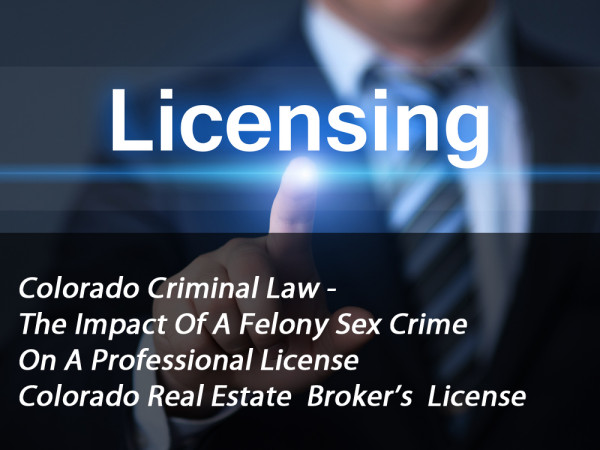
Other Articles of Interest:
- Colorado Criminal Law – First – Are We Married? To Understand the Marital Confidentiality Law – You Must Understand the Elements of Common Law Marriage*
- 18-3-305 C.R.S. Enticement of a Child
- 18-6-301 C.R.S. Incest
- 18-6-302 C.R.S. Aggravated Incest
- Colorado’s Mandatory Reporting of Child Abuse Law – the Downside of False Allegations of Child Abuse












